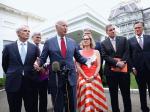 Kevin Dietsch/Getty Images
Kevin Dietsch/Getty Images
What started as a $2 trillion infrastructure plan pitched by the White House is now a $1 trillion plan backed by the president and 10 senators from both parties. But parts of President Joe Biden's original American Jobs Plan are notably missing from the framework announced on Thursday.
Biden first unveiled his $2 trillion infrastructure pitch in March, which included funding not only for physical infrastructure, like roads and bridges, but also for affordable housing and climate initiatives. While the $1 trillion plan Biden agreed to with the bipartisan group largely funds physical infrastructure, there are gaps where care-economy measures once were.
Tweet Embed://twitter.com/mims/statuses/1408119161809686530?ref_src=twsrc%5Etfw
White House top lines on the bipartisan infrastructure framework: pic.twitter.com/EjQuTF5VTN
Here's what didn't make the cut in the bipartisan proposal:
- $400 billion in home care for older adults and people with disabilities;
- $213 billion for creating and retrofitting over 2 million housing units;
- $112 billion for upgrading school infrastructure;
- And $180 billion for research and development, including $35 billion in climate research.
Funding for electric vehicles was also cut by $100 billion, and for broadband funding by $35 billion.
Progressive lawmakers criticized the deal for failing to include the care-economy measures that were in Biden's initial plan and are pushing for a bigger reconciliation bill to be passed alongside this bipartisan deal to promptly meet the needs of the American people.
"Everything that is expected is that [the bipartisan deal] will not include comprehensive clean energy policy, and I am not willing to support throwing climate overboard," Senate Finance Committee Chair Ron Wyden said on a call with the climate advocacy group Climate Power.
"The two bills have got to be directly connected," he added, referring to the infrastructure and reconciliation bills.
Last week, Vermont Sen. Bernie Sanders drafted a $6 trillion bill that included many elements left out of the bipartisan plan, like climate initiatives and affordable housing, which he said would require reconciliation. And although moderate Democratic Sen. Joe Manchin said he would support using reconciliation to pass a separate bill, he balked at the size of Sanders' proposal and the amount it would add to the national debt.
Biden appears unwilling to let his original proposals go, saying in a Thursday press conference that the bipartisan deal represented "one half" of his economic plan, and he wants to get to work "right away" on care-economy proposals. He promised the two bills would move "in tandem."
"For me, investment in our physical and human infrastructure are inextricably intertwined," Biden said. "Both make us stronger."
NOW WATCH: Why wasabi is so expensive
See Also:
- Progressives will only support the $1 trillion bipartisan infrastructure deal if it comes with a bigger reconciliation bill
- Biden strikes $1 trillion infrastructure deal with GOP while supporting separate party-line package
- Job searches are down in states cutting federal unemployment benefits early, not what you'd expect to see from a 'disincentive to work'

